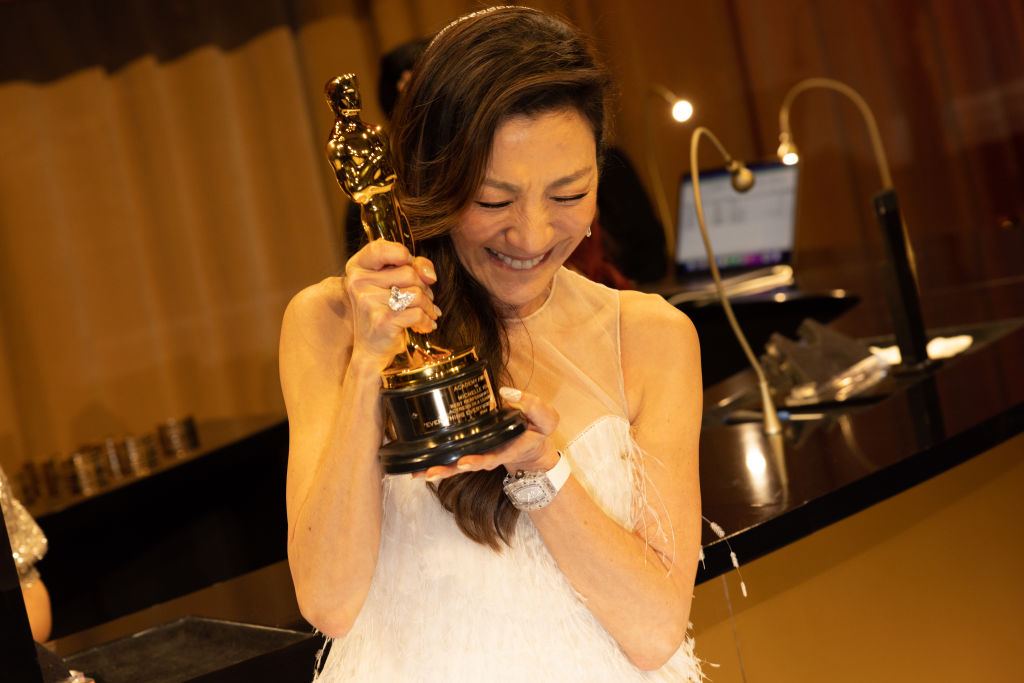It was ordained months ago that this year’s Academy Awards were going to be dominated by Everything Everywhere At Once, and so it has proved spectacularly. The film has taken seven awards, including Best Film, Best Director, Best Actress, Best Screenplay and Best Supporting Actor. While I was not one of the fans of the duo Daniels’s picture — multiverse spanning fantasy films are not exactly my bag, whether they’re made by Marvel or the hipper-than-hip indie company A24 — it’s still a distinctive and original work of cinema, albeit less likely to be regarded as a future classic than Todd Field’s magnificent Tár, which went home empty-handed.
It may well be that Tár’s magnetic star Cate Blanchett lost to EEAO’s Michelle Yeoh for reasons of optics as much as ability. The contemporary Academy likes to be seen as progressive and trendsetting, and so giving an Asian woman the award for the first time in the institution’s history gets greater socially conscious points than awarding a white Australian woman her third Oscar.
Yet there were other opportunities to embrace diversity that were largely ignored. Angela Bassett was surprisingly passed over for her regal performance in Black Panther: Wakanda Forever in favor of Jamie Lee Curtis’s fierce appearance as an IRS agent in EEAO. The much-praised duo of Viola Davis and Danielle Deadwyler were nowhere to be seen in the Best Actress line-up, ignored in favor of Andrea Riseborough’s celebrity crowd-sourced Oscar campaign for her appearance in To Leslie. And the Academy had a chance to give Elvis cinematographer Mandy Walker an award and make history, but they decided against it, instead lauding All Quiet on the Western Front’s James Friend.
There were some popular awards, including Sarah Polley’s win for Best Adapted Screenplay for Women Talking, and Ke Huy Quan, once best known for his performance as Short Round in Indiana Jones and the Temple of Doom, taking Best Supporting Actor. Brendan Fraser’s return to the Hollywood fold after years of exile was confirmed with his Best Actor Oscar for his prosthetics-heavy turn as a morbidly obese man in The Whale, although the film’s supposed fatphobia has seen it become a hot-button issue among commentators. And the ceremony’s trend away from big-budget blockbusters towards smaller winners was confirmed by Top Gun: Maverick and Avatar: The Way of Water only winning technical awards. While the show’s producers might wish for high-profile titles (and performers) to bring in the viewing crowds on television, a return to the days of winners like Gladiator, Return of the King or Titanic seems unlikely.
After the Will Smith slap last year — which so spectacularly overshadowed the rest of the ceremony that it’s hard to remember who won anything — this was a quieter, more restrained affair, although host Jimmy Kimmel did manage to get into trouble for making an anti-Irish joke in his opening monologue, suggesting there are still some minorities who are fair game. There was also a strong showing for the controversial All Quiet on the Western Front, suggesting that Netflix is now very much a player in the Hollywood game. And there were the usual tangential news angles, not least a testy Hugh Grant comparing to the whole affair to Vanity Fair on the red carpet (whether he meant the Thackeray, Bunyan or Conde Nast incarnation has been much debated).
But this was not a memorable Oscars. The sweeping victory for EEAO overshadowed several more interesting and deserving films that will, I trust, be remembered with far greater fondness.

























